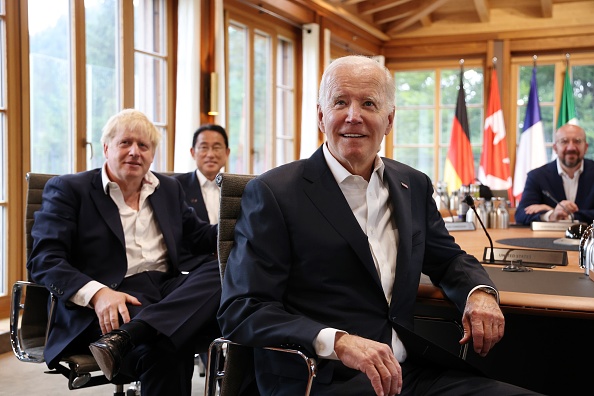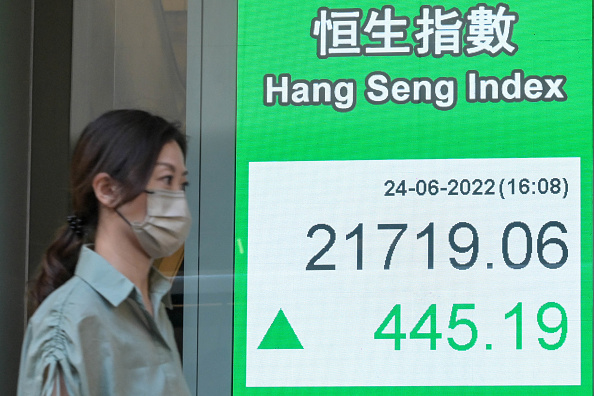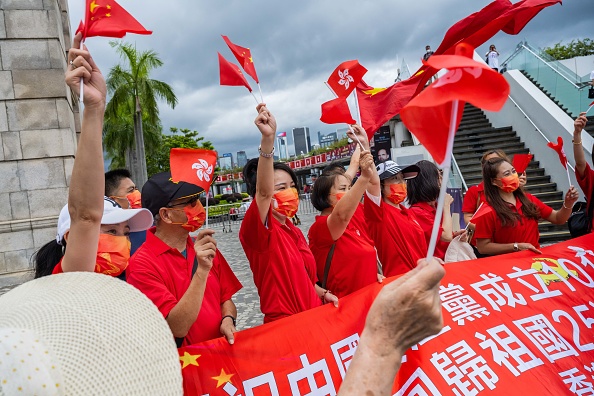
 Getting Tough
Getting ToughDuring the recent gathering of G7 leaders, Western heads of state expressed concern about China's actions in global economic, technological and military sectors. While the focus of the discussions centered on Russia's invasion of Ukraine, Beijing's refusal to condemn Moscow's actions – and its tacit backing for some of Russia's stated goals – have damaged its ties with G7 members, and drew particular attention.
The final communique by leaders from the United States, United Kingdom, Germany, Canada, Japan, France and Italy placed special emphasis on China's policy practices in the Indo-Pacific, a region where only three of the seven are closely involved, but where Beijing's growing influence has triggered anxieties about the West's future security and trading relationships in the area.
G7 leaders also announced detailed plans to mobilize $600 billion in funding for the developing world in a move seen as a counter to China's Belt and Road plan, which has been criticized as exerting undue political and commercial influence.
The Partnership for Global Infrastructure and Investment (PGII) will support projects in low- and middle-income countries that help tackle climate change as well as improve global health, gender equity and digital infrastructure. The initiative will also aim to force Chinese firms to 'match global standards' as they fund projects in poor and developing countries.
NATO also sent a strong message this week, declaring for the first time that China will be one of its strategic priorities for the next decade, saying Beijing's policies challenge its 'interests, security and values'.
"China is not our adversary," said NATO's Secretary General Jens Stoltenberg, "but we must be clear-eyed about the serious challenges it represents." In response, China called it a "completely futile" warning and said it "firmly" opposed NATO's declaration.
 Market Demands
Market DemandsAfter two months of strict lockdowns in response to the emergence of some Covid-19 cases in major Chinese cities, a sense of normalcy is returning to China at last. Shanghai gradually opened up in June, and recently announced the reopening of dine-in restaurants and Disneyland, reviving output and consumer spending.
Alongside the ease of Covid-19 restrictions has come some economic recovery as well. China's huge manufacturing and service industries just saw their first month of growth since February, according to data released Thursday.
Investors also cheered at the signs of economic recovery with China's major stock indices rallying and are poised to have their biggest monthly rise in nearly two years.
But according to a senior statistician at China's National Bureau of Statistics, there were still many companies in the manufacturing sector who reported insufficient orders. "Soft market demand is still the main problem facing the manufacturing industry," he said.
Meanwhile, the world's second largest economy also cut their travel entry requirements in half this week. Known for their strict entry stipulations, the previous 14 days at a government quarantine facility followed by seven days of isolation at home for all incoming visitors has been lessened to seven days in a quarantine facility and three at home.
But despite the change in travel requirements, Xi has reaffirmed the country's "zero-Covid policy," noting he would rather "temporarily sacrifice a little economic growth" than "harm people's health," state news agency Xinhua reported.
Read more in "Public Goods Provision and Chinese Economic Development (Part I)," by Lawrence Lau, a Ralph and Claire Landau Professor of Economics at CUHK. Twenty-Five Years On
Twenty-Five Years OnTwenty-five years ago, Britain handed Hong Kong back to Chinese rule, and Xi Jinping traveled to the city this week to commemorate the occasion. Xi and his wife, Peng Liyuan, were greeted with children waving Chinese and Hong Kong flags, masked city officials, and red celebratory banners lining the harbor front. The trip was Xi's first venture outside of mainland China since the beginning of the pandemic nearly 900 days ago.
"The whole Chinese nation is celebrating this happy occasion with Hong Kong residents," Xi said in his opening remarks.
Xi went on to defend his vision of the "one country two systems" framework amidst accusations from the West and others that Beijing has undermined the freedoms and autonomy promised to Hong Kong for 50 years after the handover.
"After the wind and rain, Hong Kong has risen from the ashes, and showed strong vibrancy. These facts prove that one country, two systems has strong vitality, which has ensured the long-term prosperity and stability of Hong Kong, and safeguarded the well-being of compatriots in Hong Kong," he said. "One country, two systems is a good system."
Xi is spending two days in the city and is attending various official events to both mark the July 1 handover, and to participate in the inauguration ceremony of John Lee, Beijing's newly appointed leader for Hong Kong who was sworn in last Friday.
Read more in "Does Hong Kong Still Have a Role to Play in Sino-American Relations?," by Brian Wong, a DPhil in Politics candidate and Rhodes Scholar at Balliol College, Oxford.
Prepared by China-US Focus editorial teams in Hong Kong and New York, this weekly newsletter offers you snap shots of latest trends and developments emerging from China every week, while adding a dose of historical perspective.
- 2022-06-24 Tools in the Box
- 2022-06-17 Unprecedented Oversight
- 2022-06-10 Squaring Off
- 2022-06-03 Diplomatic Chills
- 2022-05-27 Competing Visions
- 2022-05-20 Common Ground
- 2022-05-13 Bilateral Interests
- 2022-05-06 Vying for Mutual Benefit
- 2022-04-29 Seeking Relief
- 2022-04-22 Tipping Point
- 2022-04-15 “Persistence is Victory”
- 2022-04-08 No Divorce
- 2022-04-01 Auditing Accountability
- 2022-03-25 Playing Policy
- 2022-03-18 One Hand Cannot Clap
- 2022-03-11 Political Forecast
- 2022-03-04 Competitive Advantage
- 2022-02-25 A Sovereign Tightrope
- 2022-02-18 Strategic Disengagement
- 2022-02-11 In the Thick of It
